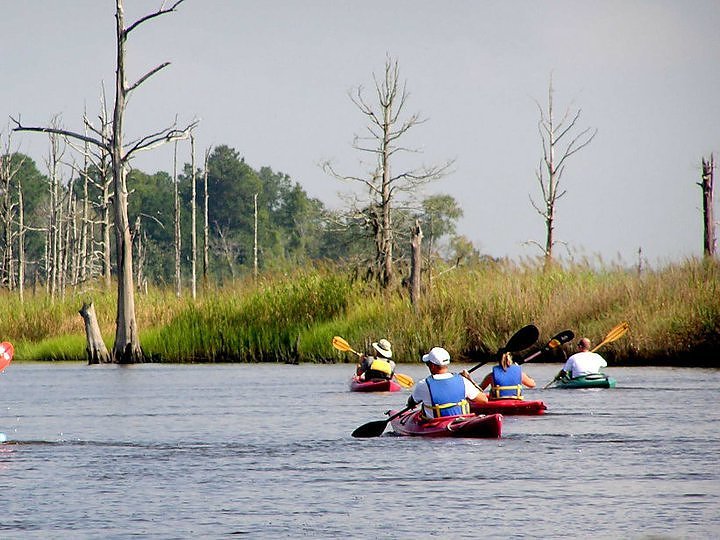Cape Fear River Watch and Waterkeeper Alliance Oppose Proposed Reclassification of the Lower Cape Fear River
By: Waterkeeper Alliance

DENR Proposal Ignores Pollution Sources to the Detriment of North Carolina Citizens
WILMINGTON, NC – March 5, 2015 – Cape Fear River Watch and Waterkeeper Alliance, working with law student researchers at Duke Environmental Law and Policy Clinic, have filed comments with North Carolina Department of Environment and Natural Resources (DENR) strongly opposing its proposal to reclassify parts of the Lower Cape Fear River estuary as swamp waters. The proposed reclassification seeks to lower water quality standards thereby allowing more pollution and ignoring upstream sources, most notably industrial hog operations whose contributions of nutrients and bacteria to waterways has long been documented.
“Given the economic, recreational, and environmental significance of the Cape Fear River, the State should be trying to improve water quality, not allowing it to be degraded further,” said Kemp Burdette, Cape Fear Riverkeeper and Executive Director of Cape Fear River Watch. “This proposal runs counter to the goals of the Clean Water Act and fails to take into account the leading cause of nutrient pollution throughout the Lower Cape Fear, namely the industrial scale hog and poultry factory farms that pollute our waterways 24 hours a day 365 days a year. DENR officials continue to ignore science and reason in favor of catering to industrial polluters.”
The Cape Fear River has the highest concentration of factory farms on Earth. Enormous amounts of waste from hog and poultry operations in the Cape Fear Basin are sprayed and spread onto fields and crops that are utterly incapable of absorbing the deluge, resulting in pollution to nearby waterways and culminating in the Cape Fear Estuary. DENR continues to ignore these significant contributions to the low dissolved oxygen and high copper levels in the Cape Fear.
“In recent years, high levels of nutrients have caused toxic algal blooms on the Cape Fear at the drinking water intakes for Wilmington and Brunswick Counties,” said Gray Jernigan, Staff Attorney for Waterkeeper Alliance. “DENR’s screen-and-mirrors approach to regulating sources of pollution, namely industrial animal operations, puts the public at great risk.”
Included in the comment letter is an analysis of the proposed reclassification conducted by Dr. Joann Burkholder, Director of the Center for Applied Aquatic Ecology at North Carolina State University, which concludes that the proposed reclassification ignores pollutant contributions from hog operations and “is not consistent with sound science.”
Additionally, a study published in January by researchers at the University of North Carolina and Johns Hopkins linked high levels of fecal bacteria in waterways to industrial hog operations. Researchers confirmed the source of the bacteria by testing for markers of bacteria that only come from pigs. In an interview with Environmental Health News, a spokesperson for DENR was dismissive of the study calling the results “inconclusive.”
Contacts:|
Kemp Burdette | Cape Fear River Watch | [email protected] | 252.670.1413
Gray Jernigan | Waterkeeper Alliance | [email protected] | 919.839.6011
####
Cape Fear River Watch has been working since 1993 to protect and improve the water quality of the Lower Cape Fear River Basin through Education, Advocacy, and Action. Cape Fear River Watch engages residents of our watershed through programs to preserve and safeguard our river. The Cape Fear Riverkeeper is a member of the Waterkeeper Alliance, an international clean water advocacy organization.
WATERKEEPER® Alliance is a global movement uniting more than 240 Waterkeeper organizations around the world and focusing citizen advocacy on issues that affect our waterways, from pollution to climate change. Waterkeepers patrol and protect more than 2 million square miles of rivers, streams and coastlines in the Americas, Europe, Australia, Asia and Africa. For more information please visit: www.waterkeeper.org